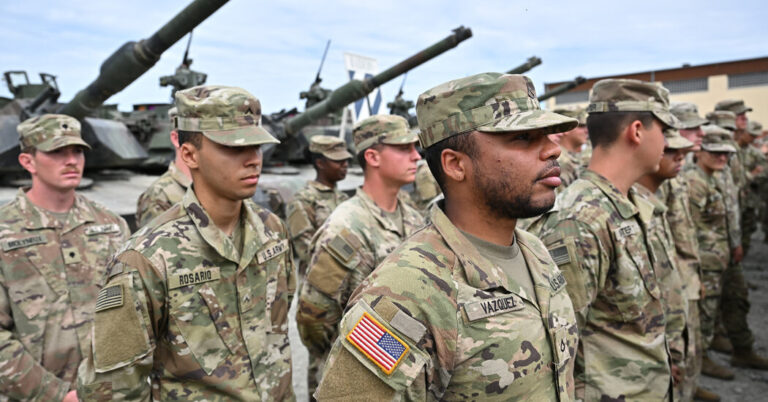U.S. defense officials raised the security alert level at military bases in Europe over the weekend in response to vague threats from the Kremlin about Ukraine using long-range weapons on Russian soil, according to U.S. and Western officials.
Officials said no specific information had been gathered about possible Russian attacks on U.S. bases. Any such attack by Russia, whether overt or covert, would constitute a significant escalation of its war in Ukraine.
Russia has been stepping up sabotage operations in Europe, hoping to disrupt the flow of supplies to Ukraine. So far, no U.S. bases have been targeted in the attacks, but U.S. officials said the increased alert level would help ensure the military remains vigilant.
Throughout the war, U.S. officials believed that President Vladimir Putin was reluctant to extend the war beyond Ukraine’s borders.
But the increase in U.S. and European aid, as well as the easing of restrictions on the use of such equipment, has caused consternation in Moscow, U.S. officials say. Russia’s recent statements have raised suspicion among some U.S. and European officials.
Ukraine uses American long-range missiles, known as ATACMS The United States has also said Ukraine could use them in cross-border attacks against Russian military targets.
The strikes on Crimea prompted Russia to summon U.S. Ambassador Lynne M. Tracy to the Foreign Ministry. And on June 24, a Kremlin spokesman said that any direct U.S. involvement in the war that resulted in the deaths of Russians “must have consequences.”
The US decision to supply long-range weapons and ease restrictions on their use follows Britain’s decision to supply Storm Shadow cruise missiles to Ukraine. kyiv had used the weapons to strike military targets in Crimea.
Strikes with Western weapons, particularly in Crimea, have proven effective, damaging the Russian military’s logistics centers and further weakening the Russian Black Sea Fleet.
But the success of the attacks has prompted Moscow to seek ways to deter further strikes.
In recent months, Russia has intensified a series of sabotage attacks Russian authorities have been conducting a military intelligence operation in several European cities. The campaign has sometimes been clumsy, such as the fire at an Ikea store. But NATO has repeatedly warned against such incidents, and Britain expelled the Russian defense attaché after a fire at a London warehouse.
Military bases that provide training, intelligence and other support to Ukraine could be a logical next target, although there is no specific intelligence indicating that Russia is considering such an attack.
Protecting military bases and the people who live and work there falls under what the Pentagon generally calls force protection. Beyond simple fences or guards protecting base gates, it consists of a series of increasingly restrictive security measures that can be implemented proportionally to a given threat.
Most U.S. military installations around the world are at the second-lowest level, called “alpha” force protection condition, which includes measures such as requiring officials to test their communications equipment and increasing spot checks of vehicles and people entering bases.
At the other end of the spectrum is the “delta” condition, defined when an attack is imminent or underway. This level shuts down non-essential functions like base schools, orders all vehicles to be searched at the front gates, adds guards, and severely restricts the movement of almost everyone on a given base.
Currently, U.S. military bases in Europe are in “Charlie” status, the second highest level and the highest level of readiness that can be reasonably maintained over a long period of time.
Over the weekend, Maj. Daniel Day, a spokesman for U.S. European Command, said the military was asking personnel to “remain vigilant and alert at all times.”
In a statement released Monday, the European Command said officials would not describe what steps they were taking to protect their operational security.
“Our heightened vigilance is not related to any particular threat,” the command said in the statement, “but rather an abundance of caution due to a combination of factors that could impact the safety of U.S. service members in the European theater.”
Eric Schmitt contribution to the report.


